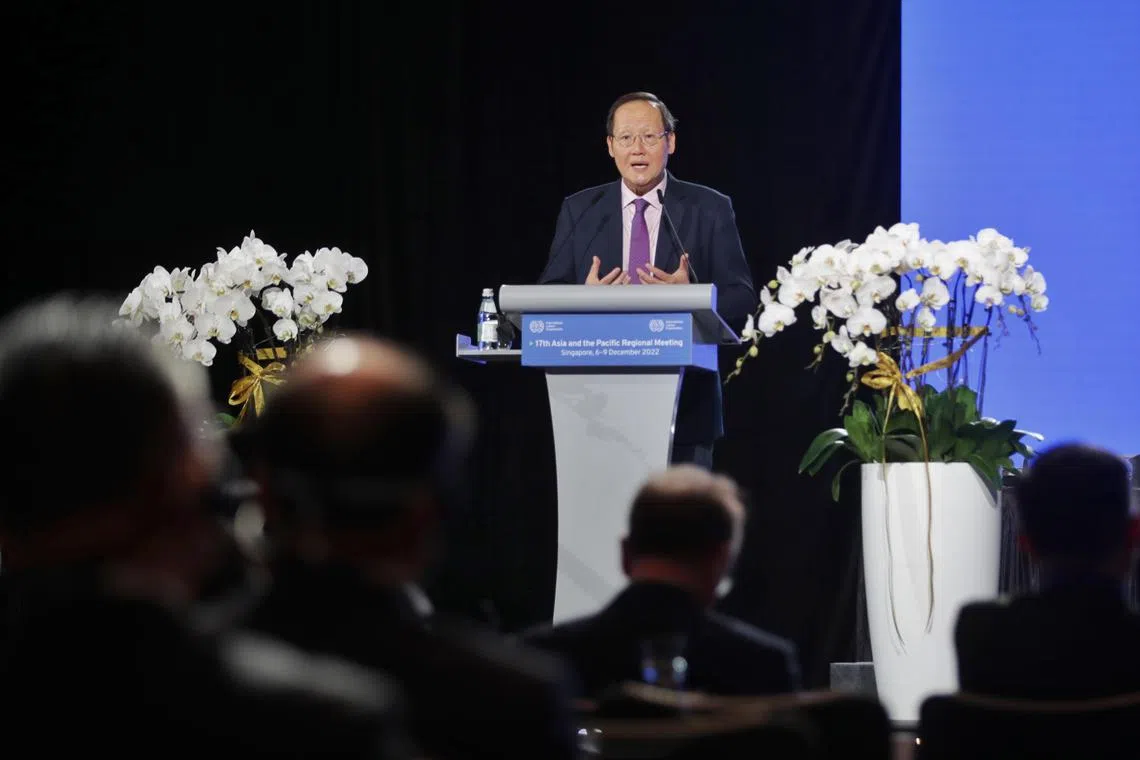Singapore Statement adopted at 4-day UN labour agency meeting
Sign up now: Get ST's newsletters delivered to your inbox

Manpower Minister Tan See Leng speaking at the International Labour Organisation’s Asia and the Pacific Regional Meeting on Dec 6.
ST PHOTO: GIN TAY
SINGAPORE - Nearly 400 worker, employer and government representatives from 33 countries in the Asia-Pacific unanimously adopted on Friday the Singapore Statement, which sets out the region’s key labour concerns to act on to ensure decent working conditions for all.
The statement is the culmination of four days of discussion on a range of topics, including ending child labour and revitalising productivity growth, at the International Labour Organisation’s (ILO) Asia and the Pacific Regional Meeting, held at the Raffles City Convention Centre.
The ILO is the United Nations agency for work-related issues.
In his closing speech, Minister for Manpower Tan See Leng, chair of the meeting, said that the ILO was founded on fostering a three-way or tripartite partnership between the Government, workers and employers.
Each partner has a part to play in a better future, a model that Singapore has practised.
“Employers must recognise that a world of work where workers are not treated fairly will lead to poor social outcomes, a weak social compact and divided societies. And ultimately, businesses cannot thrive in such fractured societies,” said Dr Tan.
Meanwhile, workers must cooperate with employers to transform their skills, take on new jobs and adapt to new ways of working to thrive in an economic environment that is evolving increasingly rapidly.
Governments anchor the worker-employer partnership by providing targeted support and formulating labour policies that are fair, coherent and can be implemented, by balancing between the views of workers and employers, he added.
The statement outlines the impact of the Covid-19 pandemic on jobs and businesses, the uneven recovery across sectors and nations, as well as additional crises such as inflationary pressures that have hampered recovery efforts.
High on the priorities for action set by the Singapore Statement is the need for member states to ratify ILO’s fundamental conventions and further strengthen the capacities of government, employer and worker representatives to carry out effective social dialogue.
The statement also calls for member countries to close wage and workforce participation gaps between genders, protect the rights of migrant workers, strengthen social protection and improve workplace safety.
In his closing speech, ILO director-general Gilbert Houngbo said that the Singapore Statement is a regional road map that meets the ambitions that members had set for the meeting. It clearly states the region’s priorities and what members expect the ILO office to deliver.
But Mr Houngbo noted that women remained under-represented at the conference, clocking in at 35.8 per cent of attendees, despite its aim to promote gender equality.
Speaking to reporters after the closing session, Dr Tan said the spirit of tripartism formed the core of the consensus formed by meeting participants.
Another thing he took away from the meeting, he said, was the need to improve the pay of lower-wage workers sustainably, an issue Singapore addresses with the Progressive Wage Model
He also noted that an emerging topic at the meeting was the provision of social protection, such as adequate retirement funds and medical coverage, as well as representation, for workers who do not fall into the traditional employment model, such as platform workers.
Asked which workforce policies of Singapore’s saw a positive reception from other participants, Dr Tan said many countries were impressed by the level of trust tripartite partners here have with one another. One example of the trust exhibited is the National Wages Council, which recommends wage increases agreed upon by workers, employers and government representatives, which has been key to closing the wage gap between lower-wage workers and the median salary.
“Many of them (other countries) actually aspire for the kind of trust, the kind of working relationship that we have painstakingly built over the last five decades.”
He added: “In fact, there are a couple of countries that have reached out to us separately. They want to learn our model.”


